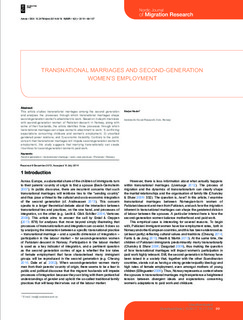Transnational marriages and second-generation women's employment
Peer reviewed, Journal article
Published version
Permanent lenke
http://hdl.handle.net/11250/2463158Utgivelsesdato
2014Metadata
Vis full innførselSamlinger
- Publikasjoner fra CRIStin [716]
- Tidsskriftpublikasjon [389]
Sammendrag
This article studies transnational marriages among the second generation and analyses the processes through which transnational marriages shape second-generation women’s attachment to work. Based on in-depth interviews with second-generation women of Pakistani descent in Norway, along with some of their husbands, the article identifies three processes through which transnational marriages can shape women’s attachment to work: 1) conflicting expectations concerning childcare and women’s employment; 2) unsettled gendered power relations; and 3) economic instability. Contrary to the public concern that transnational marriages will impede second-generation women’s employment, this study suggests that marrying transnationally can create incentives for second-generation women’s paid work.
